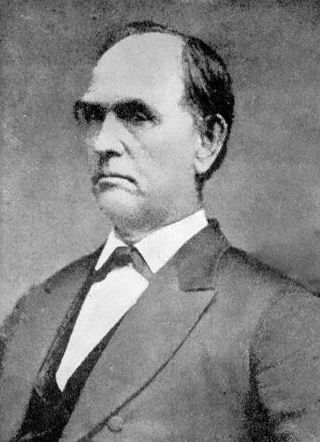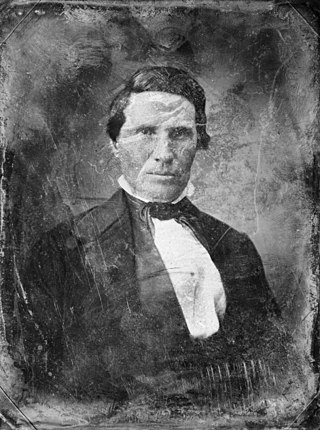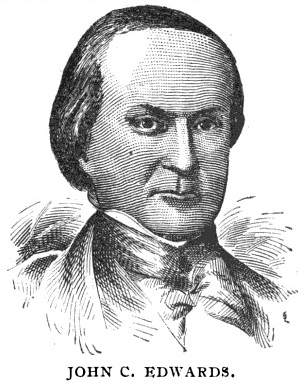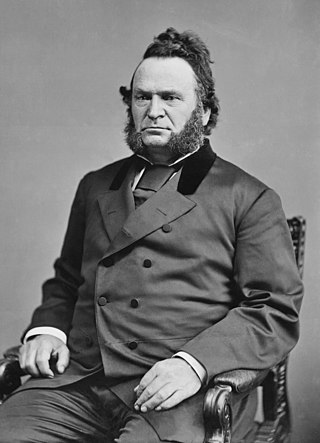Related Research Articles

David Rice Atchison was a mid-19th century Democratic United States Senator from Missouri. He served as President pro tempore of the United States Senate for six years. Atchison served as a major general in the Missouri State Militia in 1838 during Missouri's Mormon War and as a Confederate brigadier general during the American Civil War under Major General Sterling Price in the Missouri Home Guard. Some of Atchison's associates claimed that for 24 hours—Sunday, March 4, 1849, through noon on Monday—he may have been Acting President of the United States. This belief, however, is dismissed by nearly all scholars.

Henry Wilson was an American politician who was the 18th vice president of the United States from 1873 until his death in 1875 and a senator from Massachusetts from 1855 to 1873. Before and during the American Civil War, he was a leading Republican, and a strong opponent of slavery. Wilson devoted his energies to the destruction of "Slave Power", the faction of slave owners and their political allies which anti-slavery Americans saw as dominating the country.

Doniphan County is the most northeastern county in the U.S. state of Kansas. Its county seat is Troy, and its most populous city is Wathena. As of the 2020 census, the county population was 7,510. The county was named after Alexander Doniphan, a Mexican–American War hero. It is bounded on the east by the Missouri river, south by Atchison county, and west by Brown county.

Brown County is a county located in the northeast portion of the U.S. state of Kansas. Its county seat and most populous city is Hiawatha. As of the 2020 census, the county population was 9,508. The county was named after Albert G. Brown, a U.S. Senator from Mississippi and Kansas statehood advocate. The Kickapoo Indian Reservation of Kansas, the majority of the Sac and Fox Reservation, and the majority of the Iowa Reservation of Kansas and Nebraska are located within the county.

Augustus Caesar Dodge was a Democratic delegate to the U.S. House of Representatives from Iowa Territory, a U.S. minister to Spain, and one of the first set of United States senators to represent Iowa after it was admitted to the Union as a state. His father, Henry Dodge, served as a U.S. senator from Wisconsin; the two were the first and so far the only father-son pair to serve concurrently in the Senate, which they did from 1848 to 1855.

James Falconer "Jefferson Jim" Wilson was an American lawyer and politician. He served as a Republican U.S. Congressman from Iowa's 1st congressional district during the American Civil War, and later as a two-term U.S. Senator from Iowa. He was a pioneer in the advancement of federal protection for civil rights.

James Wilson Grimes was an American politician, serving as the third Governor of Iowa and a United States Senator from Iowa.

George Washington McCrary was a United States representative from Iowa, the 33rd United States Secretary of War and a United States circuit judge of the United States Circuit Courts for the Eighth Circuit.

Alexander William Doniphan was a 19th-century American attorney, soldier and politician from Missouri who is best known today as the man who prevented the summary execution of Joseph Smith, founder of the Church of Jesus Christ of Latter Day Saints, at the close of the 1838 Mormon War in that state. He also achieved renown as a leader of American troops during the Mexican–American War, as the author of a legal code that still forms the basis of New Mexico's Bill of Rights, and as a successful defense attorney in the Missouri towns of Liberty, Richmond and Independence.

John Cummins Edwards was a Democratic politician from the state of Missouri. He served as a member of the 27th United States Congress as well as the 9th Governor of Missouri.

John Brooks Henderson was a United States senator from Missouri and a co-author of the Thirteenth Amendment to the United States Constitution. For his role in the investigation of the Whiskey Ring, he was considered the first special prosecutor.
More than 1,500 African American officeholders served during the Reconstruction era (1865–1877) and in the years after Reconstruction before white supremacy, disenfranchisement, and the Democratic Party fully reasserted control in Southern states. Historian Canter Brown Jr. noted that in some states, such as Florida, the highest number of African Americans were elected or appointed to offices after the end of Reconstruction in 1877. The following is a partial list of notable African American officeholders from the end of the Civil War until before 1900. Dates listed are the year that a term states or the range of years served if multiple terms.

James Willis Nesmith was an American politician and lawyer from Oregon. Born in New Brunswick to American parents, he grew up in New Hampshire and Maine. A Democrat, he moved to Oregon Country in 1843 where he entered politics as a judge, a legislator in the Provisional Government of Oregon, a United States Marshal, and after statehood a United States senator and Representative.

Iowa Point is an unincorporated community in northeastern Doniphan County, Kansas, United States.
The 11th Kansas Volunteer Cavalry Regiment was a cavalry regiment that served in the Union Army during the American Civil War.

The 1882–83 United States Senate elections were held on various dates in various states. As these U.S. Senate elections were prior to the ratification of the Seventeenth Amendment in 1913, senators were chosen by state legislatures. Senators were elected over a wide range of time throughout 1882 and 1883, and a seat may have been filled months late or remained vacant due to legislative deadlock. In these elections, terms were up for the senators in Class 2.

John Beam Vreeland was an attorney and Republican Party politician from Morristown, New Jersey. He served in the New Jersey Senate and as the United States Attorney for the district of New Jersey.
Aspen Grove Cemetery is a cemetery in Burlington, Iowa. In 2022, it was listed as an historic district on the National Register of Historic Places.
Jairus Edward Neal was an American politician.

Edward Holcomb Stiles was a lawyer, politician and writer. He served in the Iowa House of Representatives and Iowa Senate.
References
- ↑ "Senator C. G. Bridges". Iowa General Assembly. Retrieved 8 June 2022.
- ↑ Martin, Geo. W. (1881). "Kansas Newspaper History". Transactions of the Kansas State Historical Society. 1–2: 165. Alternate URL 1 and 2
- ↑ "C. G. Bridges and wife to John F. Wilson. Lots 9 and 10, Block 22, Troy; $200". The Kansas Chief. 13 May 1875. Retrieved 8 June 2022.